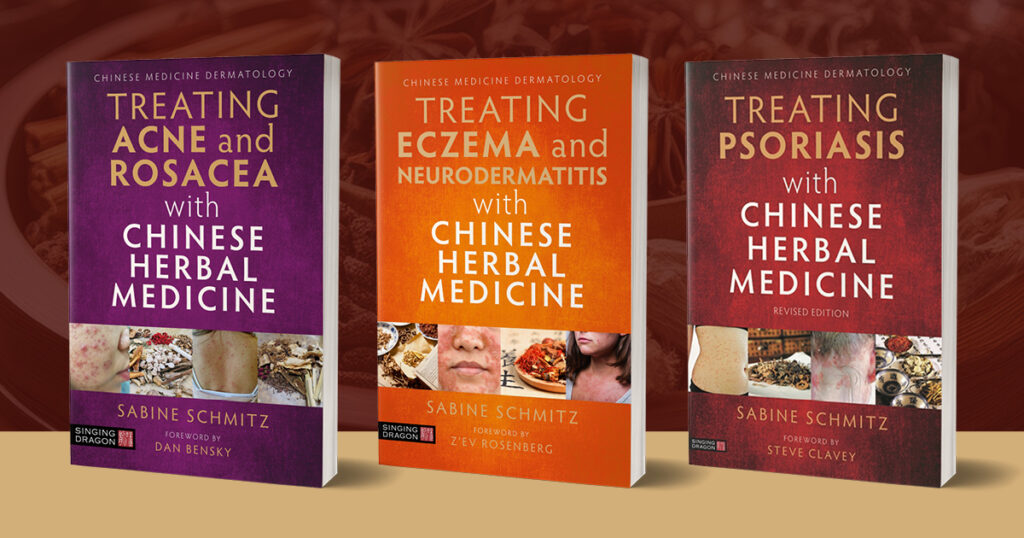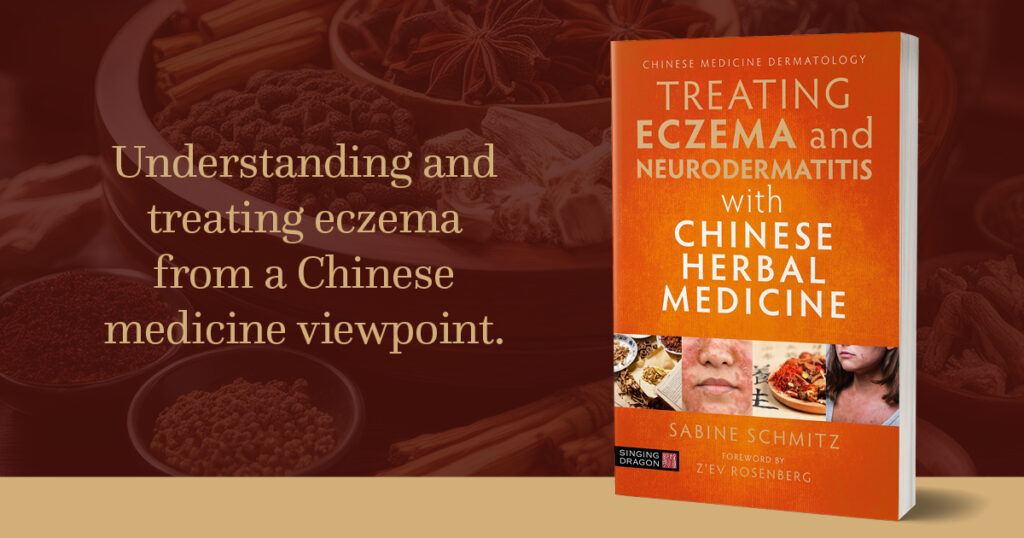Ahead of the publication of her newest book, Sabine Schmitz, talks about why she wrote the newest book and what you the role of Chinese herbal medicine in dermatology.
What inspired you to write a book about treating eczema and neurodermatitis with Chinese herbal medicine?
That’s an easy one to answer: During my TCM studies in China, I had quite a hard time finding English literature on Chinese dermatology that covered the various specialized topics. This was especially challenging since I needed to write my Master’s thesis on psoriasis. As a Westerner, I spent hours, even days, searching for books and reading literature that often wasn’t specific enough and repetitive. That’s how the idea to write a handbook series on TCM dermatology came about, to fill this gap in the literature. And let’s be honest, a medical tradition with over 2,500 years of experience should have appropriate publications on these topics. In Western medicine, there are numerous specialized books for each medical field—a tradition I wished for in TCM as well. This is crucial to making knowledge accessible to many therapists and laying the foundation for specialization.

My dermatology books cover skin conditions I see most frequently in my practice, so they’re very practical. So far, I’ve written about psoriasis, acne, and rosacea. My new book, Treating Eczema and Neurodermatitis with Chinese Herbal Medicine, focuses on eczema and neurodermatitis. With this, I’ve covered the most common skin conditions from a TCM perspective, completing my TCM dermatology handbook series. Initially, I planned to only write about eczema in my new book. But I quickly realized that neurodermatitis also needed to be included to fully describe eczema. Both conditions fall under the category of “TCM eczema,” but they have different characteristics and are treated differently. Readers will learn the similarities and differences in treating these conditions with Chinese herbs, both internally and externally.
What differences and similarities do you see between traditional Chinese medicine and Western approaches to treating skin conditions like eczema and neurodermatitis?
A recent 2022 study found that 5.5% of the European population suffers from atopic dermatitis or eczema, making it the second most common skin condition in Europe.[1] These fresh data confirm the growing trend of complex skin conditions—a trend I see daily in my TCM practice. The increasing pressure from changes in the world, the pandemic’s aftermath, and rising living costs burden our health, both mentally and physically. Dermatologically, patients develop new skin symptoms, or old ones flare up, complicating treatment and significantly impacting their quality of life. Unfortunately, the burdens of skin conditions are often underestimated despite their visible effects and emotional challenges. Eczema is a prime example. Standard treatments in conventional medicine typically offer only symptomatic relief, without addressing the root cause. Corticosteroids (cortisone) are the most commonly used treatment. The results are often unsatisfactory or not long-lasting, leading many patients to seek natural, root-cause-oriented approaches. My goal is to break this cycle—
through treating my patients and sharing my knowledge in my books. I truly believe our wonderful medicine is needed more than ever! TCM, with all its possibilities, can help patients with complex skin conditions, especially eczema.
TCM offers an individualized approach and flexible treatment strategies. It’s natural and sustainable, with minimal side effects, aside from the taste of Chinese herbs. It considers various factors, including emotions, sleep, diet, digestion, lifestyle, environment, and menstrual cycle in women. This holistic approach is something almost everyone can relate to. On the other hand, conventional medicine treats symptoms, often resulting in rebound effects after stopping medication. Not to mention the side effects of many Western medications. This doesn’t mean that conventional treatments should be rejected outright. Everything has its place, and the most important thing is the well-being of the patient, whether it’s through monotherapy or integrative approaches. The patient always comes first!
Can you give us an insight into how Chinese herbal medicine can effectively treat eczema and neurodermatitis? Are there specific herbs or treatment methods that are particularly effective?
TCM draws on centuries, if not millennia, of experience and detailed records on the effects of herbs and acupuncture on the skin. Documentation on eczema goes back over 2,000 years. So, we’re talking about a well-established, sophisticated specialty in Chinese medicine. Especially for treating many skin diseases where conventional therapies haven’t been effective, TCM has proven to be very effective. In comparison, Western dermatology as a medical field is barely 300 years old.
Unlike conventional medicine, diseases in TCM are not viewed in isolation but defined by complex patterns of signs and symptoms that make up each individual’s clinical presentation. Our focus is always on treating the underlying patterns rather than just alleviating symptoms—addressing the root cause. Based on this comprehensive diagnosis, an individualized treatment plan is developed. For severe or chronic skin diseases, Chinese herbs can be used both internally and externally, with the selection and combination of herbs tailored to the patient’s needs.
This targeted treatment with diverse options makes TCM so effective. Patients receive herbs for internal use in the form of decoctions, external applications such as washes, compresses, ointments, and of course, I use acupuncture if needed. There’s no one-size-fits-all treatment in TCM. Naturally, there are herbs and formulas I prefer because they are effective, but it always depends on the individual case. All important and common TCM patterns are described in detail in my book. The treatment strategies include modifications of the respective formulas. In my view, being able to adapt basic formulas is essential for a good TCM therapist: adjusting them every time. Our options are virtually endless! Isn’t that great?

What role does individual diagnosis and treatment customization play in Chinese herbal medicine for treating skin conditions compared to standardized Western approaches?
TCM places special emphasis on considering skin characteristics, accompanying symptoms, tongue and pulse diagnosis, and also diet, lifestyle, and environment. I think these latter points are often overlooked in stubborn cases. I aim to identify the underlying TCM pattern and address it. This means that when I work with Chinese herbal medicine, each prescription combines individual herbs chosen to meet the person’s unique needs. This way, the patient gets a tailored prescription that matches their medical situation and current state. Decoctions, for example, allow patients to manage their TCM therapy easily at home. It’s really not difficult for patients. I find it crucial that everyone can easily and seamlessly carry out their TCM therapy at home.
And my take on standardized Western treatment approaches is this: A single pill can never be effective for thousands of patients if each person has their own unique symptoms and different life situations. In my treatments, I also adjust dosages based on size, age, and gender. We all know that in conventional medicine, medications have been prescribed almost identically for men and women. But we now know that different dosages are required depending on gender. In TCM, this is nothing new.
How do you see the future of Chinese herbal medicine in treating eczema and neurodermatitis?
I’m optimistic about it. We have a lot to offer, and the demand in my practice confirms this. I get inquiries from all over Europe and sometimes even overseas. However, I must say that I don’t work online. TCM is just not suited for that. For skin, tongue, and pulse, it’s simply not possible. And aside from that, I’ve found that people want and need personal contact and conversation. We are social beings and need interaction.
The success of TCM speaks for itself, and what’s better than patients being symptom-free, sharing their positive experiences, and recommending TCM? Everyone should decide for themselves which treatment path to take, including integrative approaches. It’s all about the patient’s well-being—that’s the core. That’s why we’re here!
When we talk about the future of Chinese herbal medicine, we still have much to offer. In my practice, I approach holistic skin health 360° as a standard. Let’s think modern and consider what else TCM can offer regarding skin, health, and care. As a result, I developed the skincare line CHINAMED COSMETICS with Chinese herbs, providing patients looking for natural skincare for sensitive skin with a comprehensive TCM service. We mustn’t forget that prevention in skincare plays a central role in healthy skin. Proper skincare can prevent skin problems. As you can see, skin health is very close to my heart—with my practice, books, and skincare line.

This interview was originally published in Naturmed in German, this piece has been translated into English with permission from the interviewee.